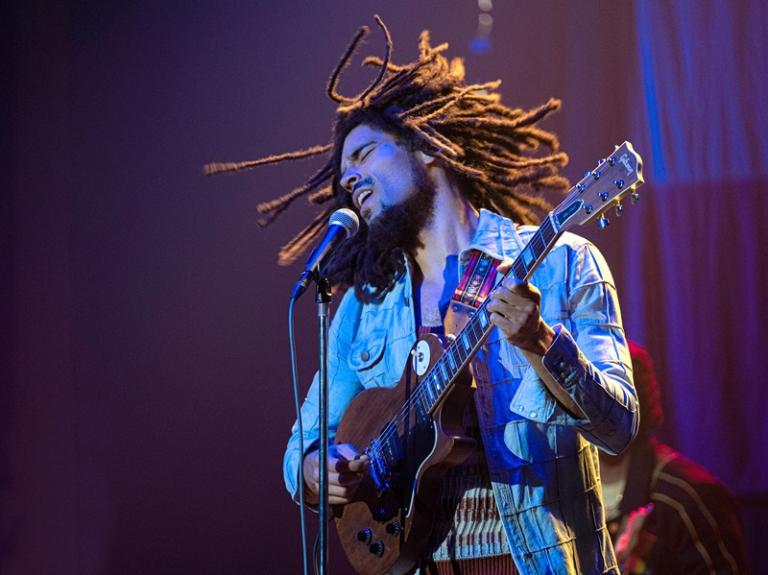
Bob Marley: One Love, in theaters now, focuses on the reggae musician who became a worldwide sensation — but the story’s only partly about that.
Mostly it’s about faith — Marley’s faith in his Rastafarian religion and how it shaped his music, his efforts to bring about peace in his native Jamaica, and his whole, tragically short, life.
Directing the film is Reinaldo Marcus Green (King Richard, We Own This City), who’s credited as a co-writer, with Terence Winter (Boardwalk Empire, The Sopranos), Caribbean filmmaker Frank E. Flowers (Shooting Stars) and Zach Baylin (King Richard, Creed III, Gran Turismo).
It Hasn’t Made Everyone Happy
As an approved profile of Marley — his son, Ziggy (one of his 11 children, both biological and adopted), is an executive producer, and other Marley family members are involved — it’s more hagiography than critical biography. This has left some critics unsatisfied (it only scores 42% with critics on Rotten Tomatoes’ Tomatometer).
And if you know little of Marley’s background or the political situation in Jamaica in the 1970s, you could get lost. Also, much of the dialogue is delivered in Jamaican patois, so those not versed in the dialect (I include myself), are not going to get every word.
I’m looking forward to watching it again on streaming … with subtitles.
A great deal of the film also centers on Rastafarianism, a religious and social movement, the nuances of which aren’t well known outside its adherents.
Who Was Bob Marley?
There are different ways to do a biopic. One is to tell the subject’s life from birth to death. The other — the one used by Bob Marley: One Love — is to pick a pivotal time in the subject’s life, and incorporate biographical details along the way.
One Love hops and skips through Marley’s backstory and important people in his life, and it’s easy to miss the details.
Against the backdrop of the often-violent clash between rival political factions in Jamaica, the film begins with a 1976 assassination attempt on Marley (British actor Kingsley Ben-Adir). Citing his religious principles, Marley didn’t align himself with either faction and promoted the ideas of unity and peace. Obviously, that didn’t please everyone.
Spoiler alert, he survived the murder attempt, but the incident set him on a trajectory that not only vastly increased his fame and visibility but strained both his marriage to wife Rita (Lashana Lynch, also British) and his relationship with his homeland.
Born biracial to an older, largely absent white father who died when his son was 10, Marley grew up largely in Trenchtown. This section of Kingston, Jamaica, is known for its government housing built around courtyards, the “yards” mentioned in many reggae songs.
All of this is dense stuff, unknown to many Americans — especially because the time frame of the film is now nearly 50 years in the past.
Doing a Little Bob Marley Homework
Many years ago, I read Catch a Fire: The Life of Bob Marley, rock journalist/editor Timothy White’s acclaimed 1983 biography. It also included some background on Rastafarianism. If you’re curious after seeing the film, I recommend it.
Or, if you’re going in cold, you might want to first watch the 2018 Netflix documentary ReMastered: Who Shot the Sheriff? A Bob Marley Story.
It also begins with the assassination and goes on to explain the political dynamics of the period and how Marley fit into them. I saw it the night before I saw One Love, and it was very helpful in filling in the blanks.
So, What Is Rastafarianism?
It’s usually described as an Abrahamic religion, a 20th-Century offshoot with roots in the same Biblical soil as Judaism, Christianity and Islam. To most Americans, it means dreadlocks, reggae music and the copious consumption of cannabis as a spiritual practice (this is almost constant in One Love).
History.com describes the religion thus:
Rising from the proliferation of Ethiopianism and Pan-Africanism, Rastafarianism took root in Jamaica following the coronation of Ethiopian Emperor Haile Selassie I in 1930. A spiritual movement based on the belief in Selassie’s divinity, its followers congregated around preachers like Leonard Howell, who founded the first prominent Rastafarian community in 1940. Additional branches surfaced by the 1950s, and within two decades the movement had earned global attention thanks to the music of devoted Rastafarian Bob Marley. Although the deaths of Selassie in 1975 and Marley in 1981 took away its most influential figures, Rastafarianism endures through followings in the United States, England, Africa and the Caribbean.
The Ethiopian emperor doesn’t appear to have played anything other than an inspirational role in the religion’s origins. For a bit of a deeper dive, here’s a 2016 account by an Ethiopian-born Jamaica resident, on the occasion of a visit to Jamaica by Prince Ermias Sahle Selassie, grandson of Haile Selassie (who was overthrown in 1974).
What’s important to know is that both Marley and Rita were true believers, with Rita introducing him to the faith. Their worldview is infused with Scripture and a sense of the immanence of deity in humans and the natural world.
As much as he was a musician and a social activist, Marley was also an evangelist.
An End-of-Life Conversion?
There are those who believe that that, near the end of his life, Marley abandoned Rastafarianism for orthodox Christianity, specifically Ethiopian Orthodoxy.
From Jesuit publication America:
Marley’s spiritual journey as a preacher continued until the end of his life. Visits to Africa shook him free of the Rastafari teaching that Ethiopia was heaven on earth. Selassie, who publicly recognized Rastafari leaders during his visit to Jamaica in 1966 (one of the first-ever public recognitions of the Rastafari in Jamaica), sent Archbishop Abuna Yesehaq to the country to bring the Rastafari into the Ethiopian Orthodox fold. Marley’s wife Rita and their children were baptized in 1973. As a result, Marley was inside Orthodox circles for close to a decade, undergoing not a radical conversion but a return—a return to his mother’s Christology and a new reckoning with his morals, particularly his main fault, sexual infidelity.
As the public face of the Rastafari movement, Marley held back from acting publicly on his spiritual evolution for a number of years. Some Rastafari considered Christian baptism to be a betrayal of the movement. Marley’s cancer diagnosis shattered those impediments. When Marley accepted baptism on Nov. 4, 1980, taking the name Berhane Selassie (“Light of the Trinity”), pent-up pain from a life of intense struggle burst forth, and he cried for half an hour. He had made it home: the full flowering of his rural Jamaican spiritual roots in Africa’s ancient Christian faith.
But Mostly, One Love Is About Music
On a personal note, I discovered Marley’s music as a teenager. So, I was happy to be all alone in my row in the theater, way in the back, so I could hum along to some of my favorite songs.
I even introduced my mother to his music.
I still smile at the thought of my elderly mom, tooling around northern New York State in her Pontiac station wagon, with Bob Marley echoing out of the windows. Apparently it amused some young guys at a stop light once, too, or so she told me, as they gave her an enthusiastic thumbs-up.
Much of Marley’s groundbreaking Exodus album is included in One Love. While Ben-Adir is more conventionally good-looking than the real Marley, he effectively captures the singer’s performing style and charisma.
Take a look:
And here’s a video with a bit more background:
Bob Marley: One Love is rated PG-13 for marijuana use and smoking throughout, some violence and brief strong language. But, other than a mildly suggestive moment between a teenage Marley and Rita, there’s no sex, and no nudity.
Because of the complex nature of the story, and the near-universal use of Jamaican patois, One Love is best for high-schoolers and up.
Image: Kingsley Ben-Adir in ‘Bob Marley: One Love’ from Paramount Pictures.
Don’t miss a thing: Subscribe to all that I write at Authory.com/KateOHare.













